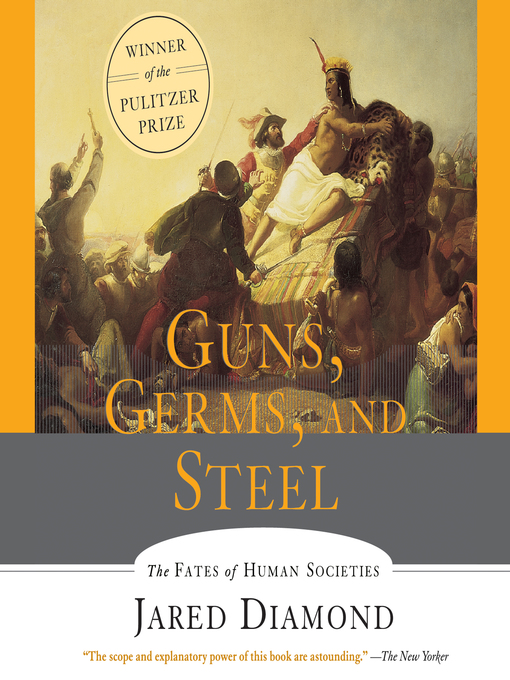
Guns, Germs and Steel
The Fates of Human Societies
کتاب های مرتبط
- اطلاعات
- نقد و بررسی
- دیدگاه کاربران
نقد و بررسی

Grover Gardener does as well with scientific material as he does with more traditional literature, giving it spirit and vitality while sounding as interested in the information as readers will be. Although he doesn't pronounce "bonobo" (pigmy chimp) like the keepers in the zoo, nor "Tenochtitl‡n" like a Mexican, his technical pronunciation is otherwise flawless. The abridgment to one-third of the original does no serious damage, but only deprives readers the privilege of enjoying more of this Pulitzer Prize-winning book about the evolution of civilization. Few writers could ever take so complex a subject and render it as palatable and memorable as Professor Diamond. J.A.H. (c) AudioFile 2002, Portland, Maine

Starred review from December 30, 1996
In a boldly ambitious analysis of history's broad patterns, evolutionary biologist Diamond (The Third Chimpanzee) identifies food production as a key to the glaring inequalities of wealth and power in the modern world. Dense, agriculture-based populations, unlike relatively egalitarian hunter-gatherers, bred chiefs, kings and bureaucratic "kleptocracies" that transferred wealth from commoners to upper classes. Such bureaucracies, Diamond maintains, were essential to organizing wars of conquest; moreover, farming societies were able to support full-time craft specialists who developed technical innovations and steel weapons. As a result, European conquerors and their colonizing descendants, bringing guns, cavalry and infectious diseases, overwhelmed the native peoples of North and South America, Africa and Australia. Using molecular biological studies, Diamond, a professor at UCLA Medical School, illuminates why Eurasian germs spreading animal-derived diseases proved so devastating to indigenous societies on other continents. Refuting racist explanations for presumed differences in intelligence or technological capability and eschewing a Eurocentric worldview, he argues persuasively that accidental differences in geography and environment, combined with centuries of conquest, genocide and epidemics, shaped the disparate populations of today's world. His masterful synthesis is a refreshingly unconventional history informed by anthropology, behavioral ecology, linguistics, epidemiology, archeology and technological development. Photos not seen by PW. BOMC, History Book Club, QPB and Newbridge Book Clubs selections.

Why is it that you white people developed so much cargo and brought it to New Guinea, but we black people had little cargo of our own? That's the question that sparked this Pulitzer Prize-winning book. Many Westerners suspect they know the answer: "We're morally or genetically superior to those folks." Author Diamond thinks not. We had animals one could domesticate, latitudinal expanses that allowed us to steal each other's inventions and nasty germs. In other words: the dumb luck to be born on the right continent. Doug Ordunio reads the book as if he had written it, with the quiet passion of an erudite man. B.H.C. (c) AudioFile 2000, Portland, Maine

























دیدگاه کاربران